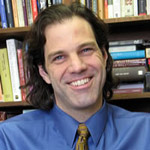
Mark Gardiner
Mark Gardiner is Associate Professor of Philosophy at Mount Royal University, Canada. We invited him to answer the question “What is Philosophy of Religion?” as part of our “Philosophers of Religion on Philosophy of Religion” series.
Philosophy of religion is whatever philosophers of religion think that it is. Trite, yes, but this way of putting the emphasis on the practice of certain philosophers rather than on what those practices are supposed to be about allows for more nuance in the question. In particular, it gives rise to host of questions, such as:
- descriptive: What it is that philosophers of religion, in fact, do?
- historical: What is it that philosophers of religion at particular past times have done?
- cultural: What is it that philosophers of religion in particular cultural settings are doing?
- imaginative: What it is that philosophers of religion might, in the future, do?
- normative: What it is that philosophers of religion ought (or ought not) to do?
These questions are, of course, thoroughly intertwined. Answers to the normative question may both serve to critique answers to the descriptive question as well as delimit a range of answers to the imaginative one. There is, for instance, a nascent movement which is critical of what is often described as ‘traditional’ philosophy of religion and which advocates a re-shaping of the field; indeed, the call to this movement is reflected in many of the blog entries on this website. Some have claimed that ‘traditional’ philosophy of religion is really just a form of theology—and that theology has no place in a properly constituted philosophy of religion. Others have argued, in a not dissimilar fashion, that philosophy’s ‘traditional’ emphasis on first-order truth questions unwarrantedly privileges conceptions of the object of study along the lines of abstract metaphysical systems, canons of beliefs, world-views, or purported representations of reality. Many religious adherents, it is often pointed out, just don’t understand their religion along these lines. Just as postmodernists critiqued the scientific realists during the science wars as having a conception of science which had lost touch with what it is that scientists actually do or have done, this movement calls for the object of the philosophy of religion to be actual religions and religious phenomena rather than some imagined type of Religion Itself or religious noumena.
I am sympathetic to this call, though am a bit leery of seeing it as an attempt to purify Philosophy of Religion. Continue reading →










